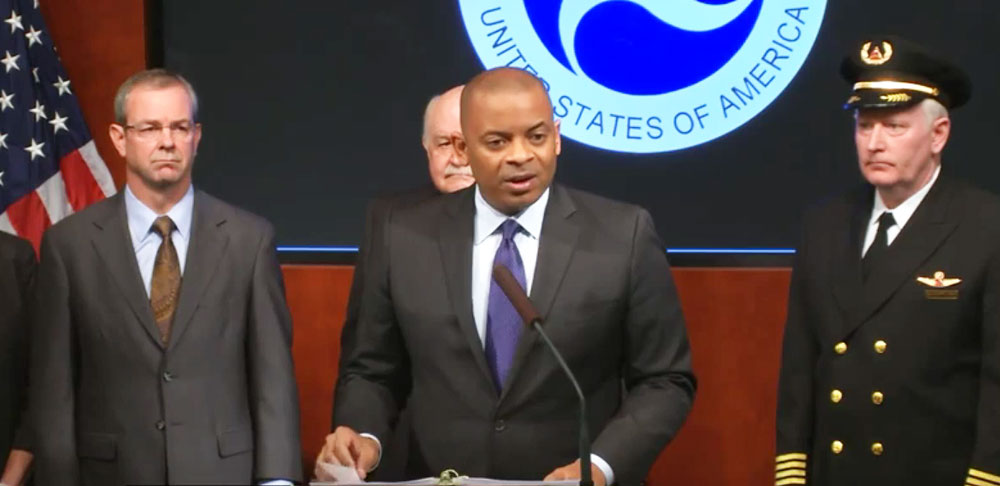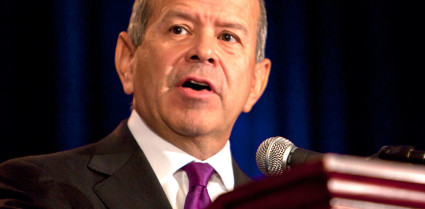
Robohub.org
What we know about the FAA’s new drone registration requirement, and what we don’t

October 19, 2015. US Transportation Secretary Anthony Foxx announces unmanned aircraft registration requirement.
Following informal reports on Friday, the US Department of Transportation (DOT) officially announced yesterday the creation of a task force that will guide the development of a registration process for recreational UAVs. Until now, only commercial drone users were required to register their aircraft with the FAA. The task force, comprising representatives from government and industry stakeholders, has until November 20 to deliver its report. UPDATE 30/10/2015 FAA announces UAS Registration Task Force members.
“It’s really hard to follow rules if you don’t know what the rules are, or whether those rules apply to you,” said US Transportation Secretary Anthony Foxx at the press conference, reiterating one of the main criticisms that has been lobbied at the FAA since 2012 when it was first tasked with the job of integrating commercial drones into US airspace.
The FAA is under pressure to show progress on the drone file having already missed their September 30 deadline to fully integrate commercial drones into US airspace. With an anticipated 1 million recreational drones to be sold this holiday season, the DOT’s goal is to have registration rules in place by mid-December. “We feel the level of urgency here is sufficient to move this process as quickly as we possibly can,” said Foxx.
Though a registry is by no means a new idea (and many are wondering why it’s taken so long), the DOT did not deviate from its main message that registration is a necessary first step in regulation. “Registration will help enforce the rules for those operating unsafely by allowing the FAA to identify the operators of unmanned aircraft,” said Foxx. “There can be no accountability if the person breaking the rules can’t be identified.”
Offering assurances that the registration process will not slow down their broader mandate to develop general rules for small UAVs, Foxx said the task force will also be looking for ways to streamline the existing registration process for commercial UAVs.
Few specifics about the actual registration process were revealed at the press conference, however this is what we know or can surmise so far:
- This is about registration, not licensing. “We are not requiring licensing,” Foxx said at the press conference, acknowledging that the FAA does not have the legal power to require licensing for recreational drones flying below 400 feet. However, “when it comes to registration, this is a safety authority that the FAA has, and it’s one that we’re exercising,” he said.
- One of the main jobs set to the task force will be classification, and this won’t be easy. Acknowledging that many UAS are “toys that pose little to no risk,” task force member Rich Hanson (Director of Government and Regulatory Affairs at the Academy of Model Aeronautics) said that the challenge will be to set the threshold for registration at an appropriate level. The task force will not only have to tackle the issue of what constitutes a toy, but also how to classify and regulate the many DIY and homemade drones that are out there — no small feat.
- Personal identifying information will be collected at registration, although exactly what data will be collected is yet to be determined by the task force. Said Foxx: “We don’t want it to be cumbersome for people to register, but we will be collecting enough information to clearly identify them.”
- Existing recreational drone owners will still need to register. Even if you purchased your drone before registration becomes mandatory, you will still need to register retroactively. According to Foxx, however, there will likely be a grace period for retroactive registration.
- There will be penalties for not registering, though exactly what these will be, and the details of who will be responsible for enforcing them — and how — remain unclear. Foxx was clear to position the FAA as a regulator and not an enforcer: when asked about who the “drone police” would be, Foxx said that while the FAA sees itself as a “partner” in law enforcement, its role is to primarily develop the framework and rules, and it will be up to the Department of Justice and local authorities to actually enforce the law. Given the difficulty of enforcement, it could be that the DOT views the registration process more as a means of enforcing broader public awareness of the safety issues related to recreational drones than as a means of policing nefarious use.
- How registration will be facilitated, and by whom, remains unclear. While Fox said the FAA believes most users will voluntarily comply with the new registration requirement, significant emphasis was put on the need for public education. With the DOT sidestepping enforcement question (for now at least), we can only conjecture. Following the lead of the Know Before You Fly campaign, which promotes giving consumers the information they need to fly safely at the point of sale, it is conceivable that some expectation of registry facilitation could fall to manufacturers and/or sellers — and with regulation coming quickly down the pipeline just as prime holiday shopping times arrives, it would certainly be in their commercial interest to do so. In an interview yesterday, Lia Reich, Senior Communications Director at Precision Hawk (a drone manufacturer that will be represented on the new task force) said that, at least on the commercial side where drone users have been required to register for some time, sellers are already helping buyers with their registration requirements: “We make sure we’re equipping our buyers with the information and tools they need so they can register easily.”
- It also remains unclear whether there will be a technical solution to the enforcement problem. Unlike a car, which is relatively easy to identify from its license plate, drones are too small to be able to visually identify from a distance, so if you wanted to report a drone incident, or quickly identify a drone and its operator, how would you do it? A technical solution would be to require some kind of transponder that broadcasts the vehicle’s registration identification number, and indeed task force member Tim Connell (President of the Airline Pilots Association International) said that they would be looking to “allow authorities to immediately identify an owner.” Note also several of the larger drone companies have been proactively working on tech solutions that could help with this sort of identification, for example Precision Hawk’s LATAS project, a real time tracking air traffic control for UAVs. However, when pressed in question period about transponders and other tech solutions, Foxx refused to answer directly, saying only that “this is about having a national registry” and “finding the drone has not been as much of a problem as finding the person who was using the drone.” He also clearly stated that geofencing is not part of this initiative. These mixed messages suggest that this is politically sensitive territory for the DOT at this time.
- Who exactly is on the task force? Somewhere between 25-30 individuals representing various stakeholders from government and industry are expected to form the task force, and at the press conference Foxx was joined by representatives from the Association for Unmanned Vehicle Systems International (AUVSI), the Academy of Model Aircraft (AMA), the Air Line Pilots Association (ALPA), the American Association of Airport Executives, Helicopter Association International, PrecisionHawk, AirMap/Small UAV Coalition, and the Consumer Electronics Association. At the time of publication, the DOT had not yet released a full list of task force members.
 UPDATE: On October 29th, FAA Administrator Michael Huerta released the list of task force members, which includes a mix of government, pilot association, and industry representatives, as promised. On the industry side we see a mix of traditional drone manufacturers (DJI, 3DR, Parrot and PrecisionHawk), drone-as-a-service companies (PrecisionHawk and Measure), new players (GoPro — which is scheduled to release their new quadcopter early next year) and big retail (BestBuy, Amazon, and Wal-Mart — which earlier this week applied for permission to test drones for home delivery). Here is the list:
UPDATE: On October 29th, FAA Administrator Michael Huerta released the list of task force members, which includes a mix of government, pilot association, and industry representatives, as promised. On the industry side we see a mix of traditional drone manufacturers (DJI, 3DR, Parrot and PrecisionHawk), drone-as-a-service companies (PrecisionHawk and Measure), new players (GoPro — which is scheduled to release their new quadcopter early next year) and big retail (BestBuy, Amazon, and Wal-Mart — which earlier this week applied for permission to test drones for home delivery). Here is the list:
- Nancy Egan – 3D Robotics
- Richard Hanson – Academy of Model Aeronautics
- George Novak – Aerospace Industries Association
- Chuck Hogeman and Randy Kenagy – Air Line Pilots Association
- Jim Coon – Aircraft Owners and Pilots Association
- Sean Cassidy – Amazon Prime Air
- Ben Gielow–Amazon Retail
- Justin Towles – American Association of Airport Executives
- Brian Wynne – Association of Unmanned Vehicle Systems International
- Parker Brugge – Best Buy
- Douglas Johnson – Consumer Electronics Association
- Brendan Schulman – DJI
- Paul Feldman – General Aviation Manufacturers Association
- Dave Vos – GoogleX (Co-Chair)
- Tony Bates – GoPro
- Matt Zuccaro – Helicopter Association International
- Mike Fergus – International Association of Chiefs of Police
- John Perry – Management Association for Private Photogrammetric Surveyors
- Brandon Declet – Measure
- Randall Burdett – National Association of State Aviation Officials
- Sarah Wolf – National Business Aviation Association
- Baptiste Tripard – Parrot
- Tyler Collins – PrecisionHawk
- Gregory McNeal – Small UAV Coalition
- Thomas Head – Walmart
- Along with the FAA and DOT, the following federal agencies will provide expert support to the Task Force: Department of Commerce, Department of Defense, Department of Homeland Security, Department of the Interior, Office of Management and Budget, National Aeronautics and Space Administration and the Department of State.
Task force members are set to begin formal meetings next week.
The US drone industry will be watching closely to see how the issue unfolds over the next several weeks, as will industry members and regulators in other countries. Says drone law expert Diana Cooper: “We may see convergence on the registration requirement.”
https://youtu.be/ohkIMnImhE8?t=10m22s
tags: drone law, drone regulation, FAA



